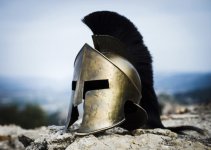Menu
Install the app
How to install the app on iOS
Follow along with the video below to see how to install our site as a web app on your home screen.
Note: This feature may not be available in some browsers.
You are using an out of date browser. It may not display this or other websites correctly.
You should upgrade or use an alternative browser.
You should upgrade or use an alternative browser.
1 - 4 of 4 Posts
There was a lot of death that’s for sure. And I don't think it was any easier to witness it just because there was so much of it. You don’t really get used to those types of things. I would have to assume that people were very traumatized by everything that was going on. There's no way that people can live happily and peacefully in such a ruthless society.
1 - 4 of 4 Posts
JOIN THE DISCUSSION AND READ OTHER GREEK INFO:
Family Trees
- Rízes Hellenic Genealogy
- Greek History Forum
- Replies: 0
Hey fellow members,
As we traverse the rich tapestry of Greek culture and history on this platform, I've been pondering something quite fascinating: our family histories. How many of us have delved into the intricate branches of our family trees?
Genealogy, the study of family history and lineage, often unveils captivating stories, connections, and traditions passed down through generations. Whether you're just beginning to trace your ancestry or have been meticulously documenting it for years, I'd love to hear about your experiences.
Here are a few questions to spark our discussion:
Looking forward to our discussion,
RizeGen
As we traverse the rich tapestry of Greek culture and history on this platform, I've been pondering something quite fascinating: our family histories. How many of us have delved into the intricate branches of our family trees?
Genealogy, the study of family history and lineage, often unveils captivating stories, connections, and traditions passed down through generations. Whether you're just beginning to trace your ancestry or have been meticulously documenting it for years, I'd love to hear about your experiences.
Here are a few questions to spark our discussion:
- What inspired you to start researching your family history?
- Have you encountered any unexpected discoveries or fascinating tales along the way?
- What resources or tools have you found most helpful in your genealogical journey?
- Do you have any tips or advice for someone interested in starting their own family tree?
Looking forward to our discussion,
RizeGen
Learning about Greek Independence Day
- cubrinj
- Greek History Forum
- Replies: 1
March 25th marks a significant celebration in Greece, but I realize my knowledge on its historical context is quite limited.
From what I understand, this day commemorates the start of the War of Greek Independence in 1821, where Greece sought to end several centuries of Ottoman rule. However, I'm eager to learn more about the intricacies of this period, the key figures involved, and how the struggle for independence unfolded over time.
Additionally, I'd be interested in understanding how this day is celebrated across Greece today and whether any particular traditions are tied to it. For example, are there specific ceremonies, parades, or family traditions that uniquely mark this day in Greek culture?

From what I understand, this day commemorates the start of the War of Greek Independence in 1821, where Greece sought to end several centuries of Ottoman rule. However, I'm eager to learn more about the intricacies of this period, the key figures involved, and how the struggle for independence unfolded over time.
Additionally, I'd be interested in understanding how this day is celebrated across Greece today and whether any particular traditions are tied to it. For example, are there specific ceremonies, parades, or family traditions that uniquely mark this day in Greek culture?

Studying the Trojan War - Was it Real?
- d_kakavouli
- Greek History Forum
- Replies: 1
Did the Trojan War really happen? I am doing a bit of research and wanted to know what you guys thought:
The war is believed to have happened around 1200 BCE, and while there is no concrete evidence to support its occurrence, it is widely accepted as factual.
What is confusing me is how prevalent it is in Greek Mythology. In addition to the gods' involvement in the conflict, various stories and legends were added over time to give the tale more depth and drama. For example, the character of Achilles was said to be invulnerable except for his heel, which led to the phrase "Achilles heel" being used to describe a person's one weakness.
While some scholars once dismissed the Trojan War as pure myth, modern archaeological evidence has suggested that it may have been a real event. Excavations at the ancient site of Troy have revealed evidence of a long period of conflict and destruction, and historians have found similarities between the tale as it is told in ancient texts and what is known about the region's history at the time. While many details of the Trojan War are still shrouded in mystery, it seems increasingly likely that it was not just a legend but a real event that has been passed down through the ages.
The war is believed to have happened around 1200 BCE, and while there is no concrete evidence to support its occurrence, it is widely accepted as factual.
What is confusing me is how prevalent it is in Greek Mythology. In addition to the gods' involvement in the conflict, various stories and legends were added over time to give the tale more depth and drama. For example, the character of Achilles was said to be invulnerable except for his heel, which led to the phrase "Achilles heel" being used to describe a person's one weakness.
While some scholars once dismissed the Trojan War as pure myth, modern archaeological evidence has suggested that it may have been a real event. Excavations at the ancient site of Troy have revealed evidence of a long period of conflict and destruction, and historians have found similarities between the tale as it is told in ancient texts and what is known about the region's history at the time. While many details of the Trojan War are still shrouded in mystery, it seems increasingly likely that it was not just a legend but a real event that has been passed down through the ages.
My Top Favorite Greek Philosophers
- paharo45
- Greek History Forum
- Replies: 1
There are too many philosophers to count, but these are the ones I am studying at the moment. It's fascinating to me how influential the Greek philosophers are. Here's some things I am learning:
#1 Socrates
If philosophy had a poster boy, Socrates might very well be it. The father of Western philosophy, Socrates was a gadfly to Athenian society, questioning everything and Master to Plato. Known for the Socratic Method and his unflinching commitment to truth, Socrates' influence is immeasurable despite never having written a word.
#2 Plato
Rightly succeeding his mentor on this list, Plato's Academy saw him birth the first "university" of its kind. His unabashed idealism, immortal Forms, allegories like the Cave, and the pursuit of 'The Good' in moral philosophy set the stage for much intellectual discourse.
#3 Aristotle
Aristotle, another of Plato's students, had a more grounded approach to philosophy than his predecessor. With establishing principles of logic and reason, and contributions to virtually every field of academia, from poetry to physics, Aristotle's body of work remains foundational.
#4 Heraclitus
Heraclitus, famed for the idea that "change is the only constant," viewed the cosmos through a lens of process, flux, and an everlasting Logos that governs the world. Although little of his work survives, his influence on ancient and modern thinkers is profound.
#5 Epicurus
Known for his eponymous philosophy, Epicurus taught that the greatest good is to seek modest pleasures in order to attain a state of tranquility, freedom from fear (ataraxia), and absence of bodily pain (aponia). Often misunderstood, Epicureanism is starkly different from the modern use of 'epicurean' - it's much less about a luxury lifestyle and more about ethical considerations regarding personal fulfillment.
#1 Socrates
If philosophy had a poster boy, Socrates might very well be it. The father of Western philosophy, Socrates was a gadfly to Athenian society, questioning everything and Master to Plato. Known for the Socratic Method and his unflinching commitment to truth, Socrates' influence is immeasurable despite never having written a word.
#2 Plato
Rightly succeeding his mentor on this list, Plato's Academy saw him birth the first "university" of its kind. His unabashed idealism, immortal Forms, allegories like the Cave, and the pursuit of 'The Good' in moral philosophy set the stage for much intellectual discourse.
#3 Aristotle
Aristotle, another of Plato's students, had a more grounded approach to philosophy than his predecessor. With establishing principles of logic and reason, and contributions to virtually every field of academia, from poetry to physics, Aristotle's body of work remains foundational.
#4 Heraclitus
Heraclitus, famed for the idea that "change is the only constant," viewed the cosmos through a lens of process, flux, and an everlasting Logos that governs the world. Although little of his work survives, his influence on ancient and modern thinkers is profound.
#5 Epicurus
Known for his eponymous philosophy, Epicurus taught that the greatest good is to seek modest pleasures in order to attain a state of tranquility, freedom from fear (ataraxia), and absence of bodily pain (aponia). Often misunderstood, Epicureanism is starkly different from the modern use of 'epicurean' - it's much less about a luxury lifestyle and more about ethical considerations regarding personal fulfillment.
Question about Greece during WWI
- ssherie_
- Greek History Forum
- Replies: 0
I am trying to learn more about Greek history. This is a family project! What I am learning about now is Greece's involvement in WWI. From what I've gathered, Greece had a rather complex and interesting stance during World War I, but I'm looking for more in-depth information.
Could anyone here provide insights or point me towards resources that detail:
Could anyone here provide insights or point me towards resources that detail:
- Greece's political climate leading up to its involvement in WWI.
- The significance of the National Schism and how it affected Greece's participation.
- Key battles or military campaigns that Greek forces were involved in.
Share and discuss Greek history!
WorldwideGreeks.com is a free online forum community where people can discuss Greek food, travel, traditions, history and mythology.
Join Worldwide Greeks here!
Join Worldwide Greeks here!
JOIN COMMUNITY FOR FREE
LOGIN TO YOUR ACCOUNT




